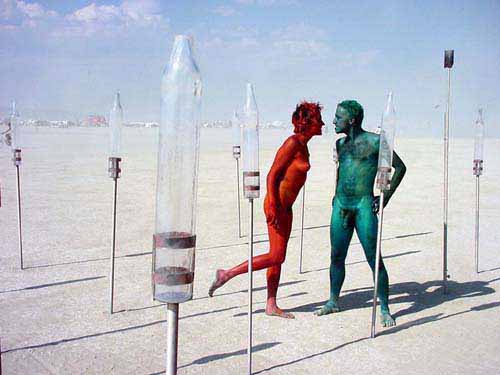Recently, I've been thinking a lot about how I've tended to
associate being
cool - that is, being the sort of person that other people want to be -
with knowledge. In reality, I suppose cool is something innate, a kind of
personality trait like calmness or determination that, if we're not born
with it, it's at least something we acquire at a very early age. But I've
long believed, or hoped, the contrary: that cool is a matter of what you
know, i.e., something you can learn. If you just learn enough about the
right social codes or records or books or films, you can develop cool
taste, talk cool, act cool. Cool is largely a matter of sincerity and
confidence, but to be confident and sincere about one's opinions, they
have to be considered. Then (and only then) whatever that personal taste
is, it's cool, if you've thought about it, and considered it, and figured
out what about it resonates with something inside of you.
Obviously, there is no one cool genre. Some people will really
groove on heavy metal music. For others, antique furniture. Whatever.
But it's cool because there is an authentic connection between the
art/social code and the person who espouses it. If you're trying to look
like a rave kid because you think it's cool, but it's not really you, then
you're a stupid poseur who needs to get real. On the other hand, if
you're really into country music, because it speaks to something inside of
you and you live the ideals for which it stands, cool.
(The only thing it would seem impossible to be cool about is
mass-produced sentimental crap like Michael Bolton or Hallmark cards,
which are inherently insincere, as they market phony sincerity in a
calculated way. Of course, you can wallow in the cheese of it, but then
what you're really into is irony, not the particular objects of your
irony.)
Recently, I attended a short film festival downtown, which was the
culmination of an 18-day long experiment. The idea: put writers,
directors, and crew together - people who didn't know each other before -
and give them two weeks to make a ten-minute film. Eight teams were
assembled, and eight films shown at the festival. (Info about the
festival: Raw
Impressions Website) The results were mixed, with
some films being entirely hilarious (e.g., a largely-improvised meeting of
Elton John fans who share their pathological obsessions) and others quite
tedious.
One film, though, stood out for being totally incomprehensible,
and exemplified the issues of artistic communication discussed above.
It's not that the film was particularly avant garde or opaque - on the
contrary, it was all too easy to watch and absorb. What was complicated
about the film was: is it a parody, or is it sincere? Are we laughing
with it - or at it?
A few facts about the film. It was called "Vicious Cycle." It
was a ten-minute faux-Broadway musical (think an L.A. version of "West
Side Story"), interspersed with a hyper-expressionistic interpretive dance
number. There were three characters: a thirty-something man, his
girlfriend, and his girlfriend's best friend, who he sleeps with. The
girlfriend finds out, the man is dumped, the best friend instantly regrets
what she has done and throws out the guy out of regret, then tries to get
him back, etc. Everyone ends heartbroken. Along the way, the audience is
treated to ludicrously awful song lyrics (e.g., "I've always fallen for
men/Who aren't my type/But I'd hoped you'd be the one/To break the vicious
cycle."), lots of over-the-top ballet-Flashdance fusion dance (featuring
three underwear-clad dancers roughly dancing out the dynamic of the three
characters), and even cheesy video editing effects.
This was bad, bad film. The question: was it intentionally bad?
 Communication, then, is essential to this form of self-definition.
Whether it is fashion or oil painting or construction or dance or music or
witty conversation or any other form of human expression, an audience made
up of people who are really, sincerely into it forms a bond of community
with the artist. And this, of necessity, means shared values. It means
that we, artist and audience, for reasons we may or may not be able to
explain, are united in our appraisal of what art best captures the human
experience, of how the "essential facts of life" are most poetically
conveyed. Obviously, these understandings are tacit and generally not
articulated or expressed. But they underlie the artistic communication
process, and create tribal communities that may transcend conventional
boundaries.
Communication, then, is essential to this form of self-definition.
Whether it is fashion or oil painting or construction or dance or music or
witty conversation or any other form of human expression, an audience made
up of people who are really, sincerely into it forms a bond of community
with the artist. And this, of necessity, means shared values. It means
that we, artist and audience, for reasons we may or may not be able to
explain, are united in our appraisal of what art best captures the human
experience, of how the "essential facts of life" are most poetically
conveyed. Obviously, these understandings are tacit and generally not
articulated or expressed. But they underlie the artistic communication
process, and create tribal communities that may transcend conventional
boundaries.
|
|
|



film politics music jay's head poetry art josh ring saddies about archive